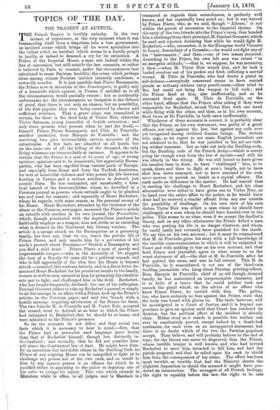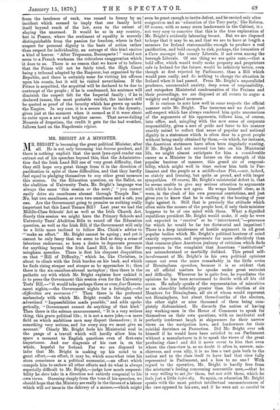TOPICS OF THE DAY.
THE TRAGEDY AT AUTEUIL.
THE French Empire is terribly unlucky. In the very instant of repentance, at the very moment when it was transmuting itself from a despotism into a free government,
an incident occurs which brings all its worst specialties into the fullest relief, an incident which seems to a hostile people
to justify, or indeed to demand, a cry for its extinction. A
Prince of the Imperial House, a man not indeed within the line of succession, but still outside the law, commits, or rather is believed by Paris to commit, under the circumstances best calculated to rouse Parisian hostility, the crime which perhaps alone among crimes Parisian instinct instantly condemns, a cowardly murder. It is just possible that Pierre Buonaparte,
the Prince now in detention in the Conciergerie, is guilty only of a homicide which opinion in France, if satisfied as to all
the circumstances, would partially excuse ; but so intolerably unfortunate are the circumstances, so incapable is the defence of proof, that there is not only no chance, but no possibility, of the first popular idea ever being corrected by sincere and sufficient evidence. That a grave crime was committed is certain, for there is the dead body of Victor Noir, otherwise
Victor Salomon, young journalist of Jewish extraction ; and only three persons were present when he met his death,— himself, Prince Pierre Buonaparte, and Ulric de Fonvielle, another journalist, born Marquis de Fonvielle ; and the surviving two give irreconcilably various accounts of the catastrophe. A few facts are admitted on all hands, but on the main one of all, the killing of the deceased, the only living witnesses are irreconcilably at variance. It appears to be certain that the Prince is a man of 55 years of age, of strong opinions, opinions said to be democratic, but apparently Buona- partist, who has been expelled from various parts of Europe, and especially from Rome and from the Turkish dominions, for acts of homicidal violence, and who passes his life between hunting in Corsica and a recluse residence at Auteuil, just outside Paris. He has contracted, not unnaturally, a fana- tical hatred of the Irreconcilables, whom he described in a Corsican journal as persons whose entrails ought to be plucked out and used for manure ; and especially of Henri Rochefort, whom he regards, with some reason, as the personal enemy of his House. Henri Rochefort, attracted by the virulence of the abuse in the Corsican newspaper, answered the Prince's article on entrails with another in his own journal, the Marseillaise, which, though penetrated with the supercilious insolence he habitually employs as a weapon, does not strike us as exceeding what is deemed on the Continent fair literary warfare. The article is a savage attack on the Buonapartes as a governing family, but does not, that we see, touch the private life of Prince Pierre, and only insults him by a perversion of his uncle's proverb about Russians,—" Scratch a Buonaparte, and you find a wild beast." Prince Pierre, a man of moody and ungovernable temper,—who, in the Assembly of '48, slapped the face of a Deputy 82 years old for a political remark, and who is full apparently of the idea that his House is beyond attack,—resented this sentence bitterly, and in a fierce letter de- nounced Henri Rochefort for his persistent insults to his family, women as well as men, sneered at him for promising his constitu- ents not to fight, and challenged him to the field. Rochefort, who has fought frequently, declined ; but one of his colleagues, Paschal-Grousset, either to take up Rochefort's quarrel or simply to air his courage in an affair with a Prince, took up the Prince's articles in the Corsican piper, and sent two friends with a hostile message requiring satisfaction of the Prince for them. The two friends, M. de Fonvielle and M. Victor Noir, accepted the errand, went to Auteuil at an hour at which the Prince had intimated to Rochefort that he should be at home, and were admitted to the Prince's presence.
So far the accounts do not differ, and they reveal two facts which it is necessary to bear in mind,—first, that the Prince had as journalist used language more brutal than that of Rochefort himself, though less distinctly in- dividualized ; and secondly, that he did not consider him- self above the Continental law of duel. He might have done. By an unwritten but inviolable clause in the Duelling Code no Prince of any reigning House can be compelled to fight or to challenge any person not of his own rank, and an insult to him by any meaner person is an offence for which he is justified either in appealing to the police or deputing one of his suite to avenge his injury. This rule, which extends to Ministers while in office, to all judges, and to Marshals in
command as regards their subordinates, is perfectly well known, and has repeatedly been acted on ; but it was waived.
by Prince Pierre, who, as we said, though " Altesse," is not within the patent of succession to the Imperial throne. On the entry of the two friends into the Prince's room, they handed him a challenge from their principal, M. Paschal-Grousset, which.
he read and rejected, declaring that while he would fight M. Rochefort,—who, remember, is in the European world Vicomte.
de Lucay, descendant of a Crusader,—he would not fight any of' his " instruments ;" and then,—one of two scenes occurred.- According to the Prince, his own left arm was raised " in
an energetic attitude,"—that is, we suppose, he was menacing, a blow,—when M. Victor Noir struck him, and he took a,
loaded revolver out of his pocket and fired, inflicting a mortaY wound. M. Ulric de Fonvielle, who had drawn a pistol in, self-defence,—everybody concerned seems to have carried pistols as ordinary citizens carry pencil-cases,—then tried to. fire, but could not bring the weapon to full cock ; and the Prince fired at him, also ineffectually, and as he retreated fired again. M. Ulric de Fonvielle, on the other hand, affirms that the Prince, after asking if they were- responsible for Rochefort, struck Victor Noir with one hand. while firing with the other, and then, as in his own account,. fired twice at De Fonvielle, in both cases ineffectually.
Whichever of these accounts is correct, it is perfectly clear that the Prince, on his own statement,' was guilty of a great offence, not only against the law, but against any code ever yet recognized among civilized human beings. The writers who urge, as we regret to see some English journalists are not ashamed to do, that he was justified in his act are talk- ing wicked nonsense. Let us take not only the Duelling code,. but the Duelling code of the French Army—which is surely going far enough away from the law of morals—and still he was utterly in the wrong. He was still bound to have givere his insulter' ime to draw, to have " challenged " him, so to. speak, there and then to fight at arm's length, not to have shot him down unarmed, not to have assumed of his own mere motion to punish an insult as a capital offence. His rank made no difference in the matter. He had waived that in sending his challenge to Henri Rochefort, and his clear alternatives were either to have given one to Victor Noir, or. to hand over the entire affair to the police, as he would have- done had he received a similar affront from any one outside the possibility of challenge. On his own view of his own duties, Victor Noir was either a man whom he should have challenged, or a man whom he should have handed over to the police. This seems to us clear, even if we accept the duellist's. theory, and on any other whatsoever the Prince killed a man who was putting his life in no danger whatever, and whom. he could easily and certainly have punished for the insult.. We say this on his own account ; but it must be remembered that M. de Fonvielle gives his story with a full knowledge or the terrible cross-examination to which it will be subjected in Court and with nothing to fear on his own account, and that both Prince and journalist agree in what seems to us the worst statement of all,—the shot at M. de Fonvielle after he had quitted the room, and was in full retreat. This M. de Fonvielle, be it remembered, is not one of the third-rate duelling journalists who hang about Parisian printing-offices. Born Marquis de Fonvielle, chief of an old though decayed family, he has maintained an irreproachable character, and is so little of a bravo that he could neither cock nor uncock the pistol which, on the advice of an officer who knew Prince Pierre, he carried with him. The police, too, who have certainly no bias against the Prince, state that the body was found with gloves on. The facts, however, will be investigated in a Court of Justice, and it is beyond our province to give an opinion until that Court has rendered its decision, but the political effect of the incident is already clear. Either story as it stands is possible, but neither can ever be conclusively proved, except indeed by a death-bed confession, for each rests on an unsupported statement, but there is no doubt which of the two the Parisian populace accept. They believe, and will probably believe to the end of time, for the theory can never be disproved, that the Prince, whose terrible temper is well known, and who had invited Rochefort to meet him, intended to kill him, and had the pistols prepared, and that he relied upon his rank to shield him from the consequences of his crime. The effect has been most terrible, so terrible that had the Ministry shown the slightest disposition to shield the accused it might have pro- duced an insurrection. The strongest of all French feelings, the right to equality before the law, the right to be safe 'from the insolence of rank, was roused to frenzy by an incident which seemed to imply that one family held itself beyond reach of the law, even to the extent of slaying the unarmed. It would be so in any country, but in France, where the sentiment of equality is scarcely distinguishable from the passion for freedom, where in fact -respect for personal dignity is the basis of action rather 'than respect for individuality, an outrage of this kind excites a kind of horror. "After Tropmann, Buonaparte I " would not seem to a French workman the ridiculous exaggeration which it does to us. There is no reason that we know of to believe that the Prince will not be fairly tried, the High Court being a tribunal adopted by the Emperor, but organized by the Republic, and there is certainly none for visiting his offence upon his cousin, but it will be visited nevertheless. If the Prince is acquitted, the acquittal will be declared to be due to contempt of the people ; if he is condemned, his sentence will diminish the respect felt for the Imperial family ; if he is declared insane, the most probable verdict, the incident will be quoted as proof of the ferocity which has grown up under the Empire. In any case, it is a severe blow to the dynasty, -given just at the moment when it seemed as if it were about to enter upon a new and brighter career. That never-failing Nemesis of despotism, the credit it gets for the bad weather, follows hard on the Napoleonic regime.































 Previous page
Previous page